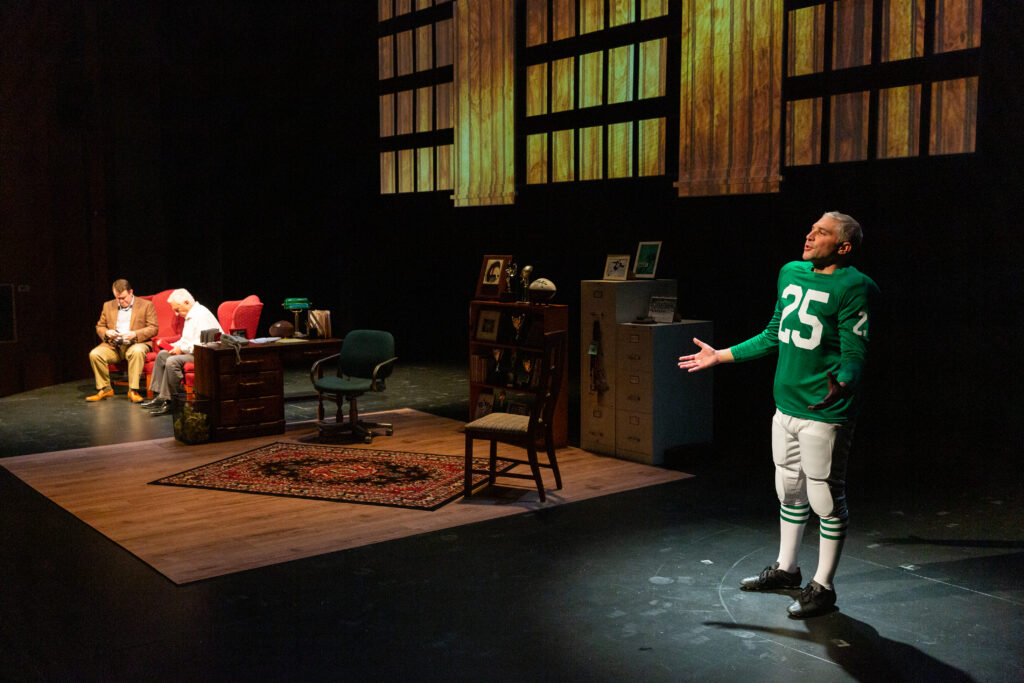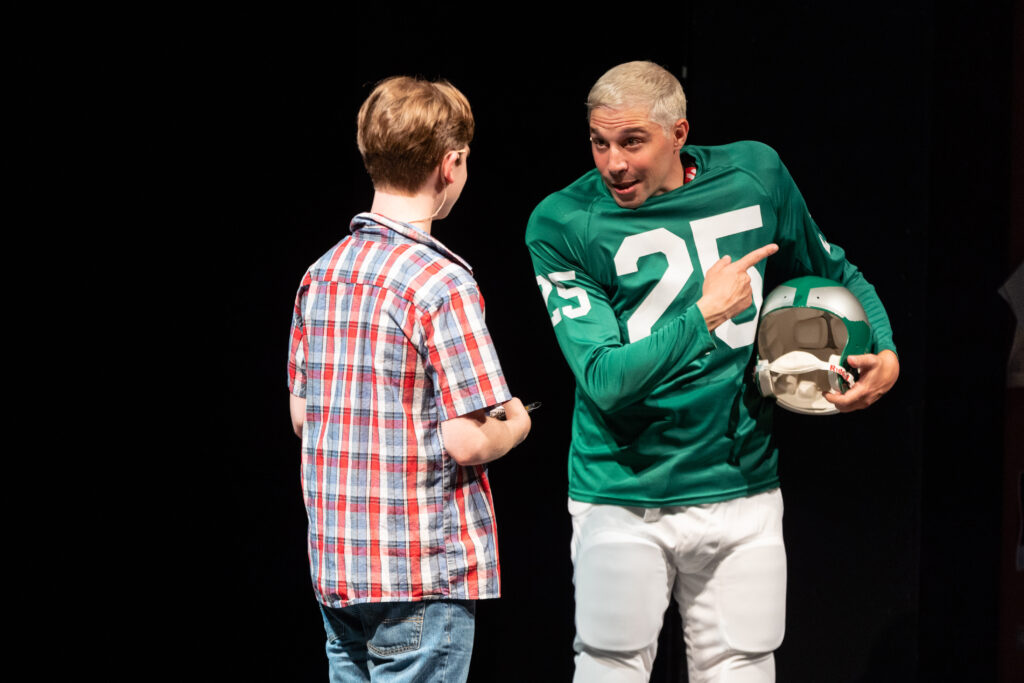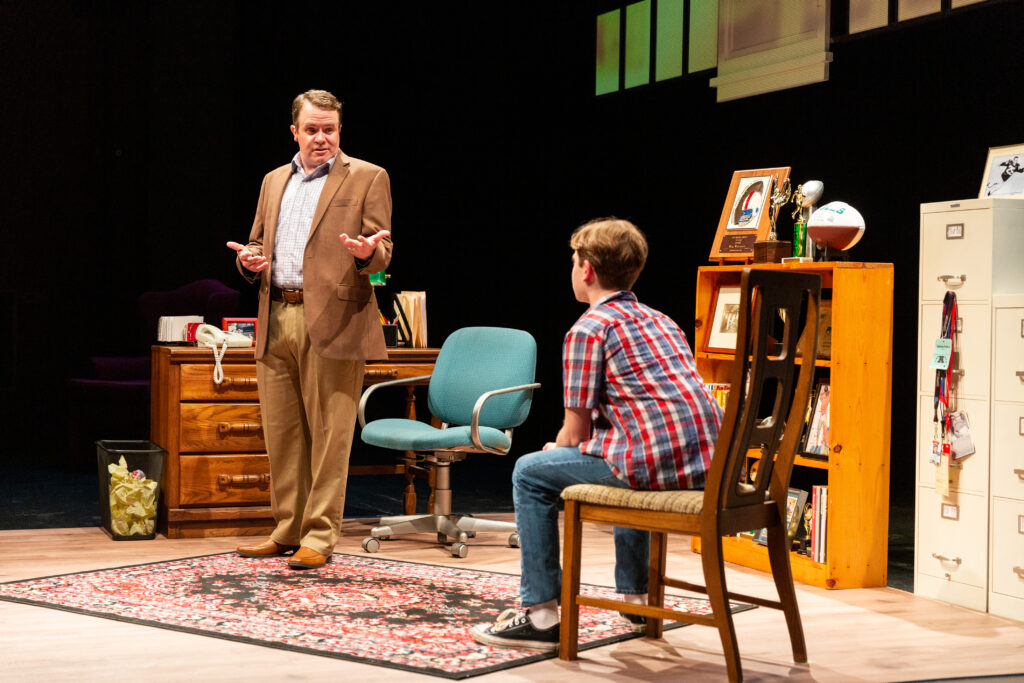Ad Disclosure
Q/A: Ray Didinger on the 10th Anniversary of his Successful “Tommy and Me” Play, and How We’re Supposed to Act When the Eagles are Doing So Much Winning

Is there any actual crossover between diehard Philadelphia sports fandom and the performing arts?
That’s the question we asked ourselves in 2015 when respected veteran scribe Ray Didinger introduced his Eagles screenplay, titled Tommy and Me. It’s the story of a young Birds fan and his hero, Tommy McDonald, the Hall of Famer who helped deliver the 1960 NFL Championship while going to six Pro Bowls along the way.
Ten years later, the question is answered with a resounding “yes.” Yes there is real crossover between the 700 Level and the stage because Tommy and Me has been performed in theaters from Philly to Hershey and demand hasn’t waned at all. After a sold out winter run, a 2025 fall run will place during the Eagles’ bye week, performed from October 7th to October 19th at the People’s Light theater in Malvern.
Coincidentally, this run for Tommy and Me will take place two days after a Delco run of Spinner, which is a hockey play Didinger wrote only recently. So Ray now has two plays to his name as he enjoys a much more relaxed schedule after stepping away from 94 WIP weekends and NBC Sports Philadelphia in May of 2022.
We caught up with Ray to talk about the play, and the Birds:
Crossing Broad: How’s pseudo-retirement treating you? I say pseudo because you’re still active here and there.
Ray Didinger: It’s good. Honestly, when I did “retire,” it was with the full intention of retiring. I really did (intend to not work). What’s happened, in terms of keeping me active, is it’s really just a function of what’s happening with the Phillies and Eagles. As long as the Phillies and Eagles keep winning, my phone keeps ringing. And that’s fine, that’s okay. I can be as busy as I choose to be. That’s probably the best way of putting it. I’m not locked into every Saturday and Sunday morning having to be at WIP. I don’t have to be at NBC Sports Philly every Sunday for Eagles pre and postgame. I don’t have that stuff I’m locked into. If I have stuff I feel like doing, I do it, and if I don’t, I don’t.
I’ve had to now update The Eagles Encyclopedia twice. I didn’t intend to write four editions (laughs). We did the original one and then the second one ten years later. I told the editors at Temple Press after we did the second one, ‘I think we’re good unless the Eagles win a Super Bowl, ha ha ha.‘ Then lo and behold comes Super Bowl 52, which sort of cries out for a version three. Then came last year and here we go with encyclopedia four, which is probably going to be out next week or the week after.
CB: As we typically say, these are good problems to have.
Didinger: Oh yeah! Absolutely. Updating the last Eagles Encylopedia was really a challenge because we were on a really tight deadline to get the book out in the fall. The Super Bowl is in the middle of February now. I had to turn around a 520-page book in five weeks. That hardly qualifies as retirement (laughing).
CB: So Tommy and Me is coming back in October. What’s the CliffsNotes for this run?
Didinger: This will be the 10th anniversary. We first performed it as a public reading in 2015. Here we are in 2025 and doing it yet again. It’s been one of these things where different theaters contact us, wanting to do the play (Ray names nine theaters that have shown the play). We had a great run at Delaware Theater Company and People’s Light theater out in Malvern in January. It was supposed to be a three-week run and it was so successful that they extended it for another week. We still sold that out. So they said they wanted to bring this play back and scheduled us for right now. We’ll be there Tuesday, October 7th, through the 19th.

CB: To what do you attribute this staying power for the play?
Didinger: In the simplest terms, it’s just a feel-good story. It’s just a really uplifting, happy-ending, feel-good story. With the times we’re living in right now, I think we kind of need that. I really feel like that’s what sustained it. And I think it’s proven by people coming back and seeing it multiple times. I’m always having people coming up to me and saying it’s their third or fourth time seeing it. The thing I didn’t anticipate, but has truly been proven true over time, is that you don’t have to be an Eagles fan, even a football fan, to enjoy the play. I thought initially, back in 2015, that it would really appeal to Eagles fans, that they were the people who wanted to come out and see this play. And they have. You come to a Tommy and Me performance and half the audience is wearing Eagles stuff. It’s not your traditional theater audience. Shaun Young comes in his face paint and shoulder pads. It’s not Hamilton (laughs). And that’s part of it for sure.
But there’s a whole bunch of other people there who aren’t football fans. After every show we do a 15 minute Q&A with the audience and talk about the play. Without exception, there’s somebody in the audience who will say that they aren’t a football fan, that they don’t watch it or care about it, but that they love the story. The story is really about a little boy and his hero, and how their relationship, how it begins and grows, and how, over the course of 40 years, it changes both their lives. And okay, it’s a football player, it’s Tommy McDonald, but it could be anything, that hero could be a concert pianist, it could be…
CB: Well it’s relatable, right? It’s the story of a formative moment when it clicked for somebody, and they found their fandom.
Didinger: You’re 100% right. That’s exactly what it is. And when I wrote it and we first performed it, I didn’t think about that. I was really just thinking that Eagles fans would get a kick out of it. I didn’t really think about how much beyond that it could go, that people could relate to the story in a profound way. But it does kind of cross all lines. Dick and Carol Vermeil have come to see it four times. Seth Joyner has seen it four times. The fact that people keep coming back is what’s sustained it. That’s why we’re still doing it 10 years later. People didn’t come and see it one time and say “hey that was cool.” They keep coming back and bringing neighbors, or the guy who sits next to them at the Linc. Those people have expanded the base to a point now where it’s really great. I didn’t envision this. Never imagined we’d be doing it 10 years later, but here we are.
And one of the best parts about it is what it’s meant to the McDonald family. That to me is probably the most beautiful part of the whole thing. Tommy and (his wife) Patty were both still alive when we did it the first time. They came and had a ball and loved it. They’re gone now, but their four kids, and grandkids, they come back every year. And I’ve heard from Tommy Jr. and Patty that they’re coming back this year. Last year, one night, I was walking (Tommy’s daughter) to her car, and I said, ‘I think it’s a wonderful thing that the family comes back every year to see the play.’ And she said, ‘your play has kept dad alive for us,’ and I had never thought about that, but it makes perfect sense. They come back and sit there in the theater and see the film and it does bring back a wonderful, happy part of all of their lives. That’s one of the most beautiful byproducts of the whole thing.
CB: I’ve always been fascinated by this overlapping world of Philly sports media and thespianism. You’ve written plays. Glen Macnow is on the stage now. Anthony San Filippo has been trying to get me involved for half a decade. And Anthony Gargano has written screenplays. Where do you think this comes from?
Didinger: I think in Glen’s case, he did theater in high school and really enjoyed it. I think he always had the thought in the back of his mind that he would find his way back into it. Players Club of Swarthmore (PCS) is really very good. It’s community theater done at a really high level. Anthony (San Francisco) really recruited him for that, since he’s been involved in PCS for a number of years. He’s the one that first said to Glen, ‘why don’t you give this a try?‘ And when he went back, he really got the bug. Now he’s auditioning for stuff all the time. He’s done several plays. I saw him in Anything Goes, and Guys and Dolls, Network, in straight drama and comedy and musicals and he’s really good at it.
CB: It’s probably as simple as the early journalists and sports writers primarily story tellers. That connects spiritually to the liberal arts and humanities. You can tell a story in print, on a webpage, on a podcast, and you can tell a story on the stage also.
Didinger: I think that’s true. Well, in my case, it is as simple as that. I’m just a writer. Glen is actually on stage doing it. Anthony has gone on stage. He’s very good. He’s also a director… For me, it really is purely about story telling. It’s something I’ve been doing my whole life. I’ve written books, done TV documentaries for NFL Films, and was a columnist for 30 years, so writing and telling stories, now I’m just taking it to the theater. It was a pretty easy transition. A pretty straight line.
CB: We were talking before we started recording about all of the winning that the Eagles have been doing recently. It’s strange to be in a position where they’re 4-0 and have won 20 of their last 21 games. I’m thinking that there’s not much to complain about, but if I sat down every day and wrote “the Eagles are amazing, the end,” that wouldn’t make for much of a website, would it? So we’re in this unusual position of a historically skittish and negative fan base experiencing immense success. What’s your read on all of that?
Didinger: There really are two conversations going on. One is the conversation that they’re 4-0, won 20 of 21 and are right now on the greatest run of success this franchise has ever had. In history! You go back to Steve Van Buren and Chuck Bednarik, they won back-to-back championships but they never had a run like this. That just doesn’t happen in the NFL. It’s Friday Night Lights stuff. It can happen there, in places like a high school program, but it doesn’t happen in pro football. There is that segment of the fan base saying ‘let’s celebrate the good times, let’s enjoy what’s happening here, this team is winning every single game.’
On the other side, it’s kind of rooted in Philadelphia sports history, this longstanding idea we all grew up with, that the good times can’t last. ‘Yeah they won that game but they won’t win the next game.’ That’s how we all grew up. That was the reality of it. And you don’t get over that overnight, or even in a couple of years. There’s always that sense that it’s great now, but it’s gonna go bad. The other conversation is that they can’t play a full game, almost blew a big lead in Tampa, they were basically dead and buried against the Rams but came back and won on a blocked field goal. They don’t find it sustainable.
And the fact is, they’re both valid. They really are. This is the proof of the old thing where “two things can be true.”
CB. Our site philosophy.
Didinger: Are these good times? Absolutely these are good times. These are great times! There’s something to be said for enjoying that. At face value, you say that this doesn’t make any sense. How can a fan base be having these kinds of arguments? But when you take a step back and look at it, and you put it into the context of Philly sports history, yeah, I get it. I really do get it.
CB: My observation is that these attitudes are split down generational lines. You’re in your mid 40s, or 50 or older and you saw a lot of Eagles losses. You come more from the accountability tree, vs. a younger group of fans that I think is more empathetic towards the players and has more access via social media or peer-to-peer podcasting. I sense the latter is enjoying the run while the former is always focused on improving and fixing mistakes. I don’t know if either approach is the right one, but I do get a sense that it’s split this way.
Didinger: I think that’s very true. And I think it’s a hundred percent true that if you are of a certain age, and at this point I am (laughing), and you lived through the 1964 Phillies (blew a 6.5-game lead with 12 games remaining to miss the World Series), you never get over it. I’m still not over it. Last week I turned 79 and I’m still trying to figure out how they blew the pennant. That whole mentality, I guess Garry Cobb coined the phrase ‘Negadelphia,’ this idea that it’s a town that wallows in its misery and they boo all the time and they’re mean and negative. Philly fans don’t like to hear it, but it’s certainly true, to a degree. Then you ask of the question of where did this all come from? Where did it begin? I really trace it back to ’64. It was a baseball season that seemed to come out of nowhere. A team that couldn’t tie its shoes for the better part of 20 years, all of a sudden couldn’t do anything wrong. You absolutely felt like ‘wow, this is it.’ You didn’t expect it and didn’t know where it came from. But damn, maybe this team is going to the World Series, and they might win it. In our house, literally the day the World Series tickets arrived in the mail, was the day the losing streak started. That kind of disappointment you never get over. We still have, hanging on my wall, our 1964 World Series tickets, framed and hanging. At a certain point, I think it becomes part of who you are. When you get into a stretch like we’re in now, the Phillies and Eagles doing nothing but winning, you’re enjoying it like crazy, but there’s always that part of you that, you come back home and there are your 1964 World Series tickets and you kind of remember what that was like, too.
Tommy and Me will run October 7th through 19th, at People’s Light in Malvern. Tickets start at $59 and can be purchased at peopleslight.org or by calling 610 – 644 – 3500.

Kevin has been writing about Philadelphia sports since 2009. He spent seven years in the CBS 3 sports department and started with the Union during the team's 2010 inaugural season. He went to the academic powerhouses of Boyertown High School and West Virginia University. email - k.kinkead@sportradar.com